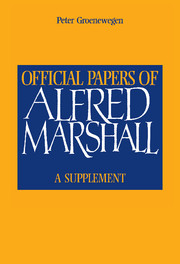Book contents
- Frontmatter
- Contents
- Preface and acknowledgements
- General introduction
- ITEM 1 Evidence to the Committee Appointed to Inquire into the Condition of Intermediate and Higher Education in Wales and Monmouthshire by Alfred Marshall, given at Newport, 20 December 1880
- ITEM 2 Gold and Silver Commission: note by Professor Marshall on Professor Nicholson's paper ‘On the Effects of a Fall in the Gold Price of Silver and General Gold Prices’ (dated 30 June 1888)
- ITEM 3 Material associated with Marshall's work for the Royal Commission on Labour 1891–1894
- ITEM 4 Appendix: Treasury document: ‘The Fiscal Problem’, 25 August 1903
- Index
ITEM 4 - Appendix: Treasury document: ‘The Fiscal Problem’, 25 August 1903
Published online by Cambridge University Press: 04 August 2010
- Frontmatter
- Contents
- Preface and acknowledgements
- General introduction
- ITEM 1 Evidence to the Committee Appointed to Inquire into the Condition of Intermediate and Higher Education in Wales and Monmouthshire by Alfred Marshall, given at Newport, 20 December 1880
- ITEM 2 Gold and Silver Commission: note by Professor Marshall on Professor Nicholson's paper ‘On the Effects of a Fall in the Gold Price of Silver and General Gold Prices’ (dated 30 June 1888)
- ITEM 3 Material associated with Marshall's work for the Royal Commission on Labour 1891–1894
- ITEM 4 Appendix: Treasury document: ‘The Fiscal Problem’, 25 August 1903
- Index
Summary
On 2 July 1903, Marshall received a letter from Theodore Llewellyn Davies, the principal private secretary to the Chancellor of the Exchequer, C.T. Ritchie, asking him to present his views on the ‘fiscal problem’ which had been engaging the attention of the British public and its government since the spring of that year. Marshall's views were sought confidentially, for the eyes of the government only, though Llewellyn Davies indicated that there would be no problem for Marshall to publish this material later under his own name, if he so wished. Although Marshall was given carte blanche in what he could write, two issues were to be specifically addressed by him. To quote Llewellyn Davies, these were:
(1) Imperial Preferential Tariffs ― involving import duties in this country on Food and perhaps other more or less Raw materials
(2) Retaliatory duties ― adopted primarily perhaps for the purpose of Tariff negotiations, but involving most certainly permanent and systematic protection of Manufactures.
Lewellyn Davies went on to indicate the ‘endless issues arising out of these two main points’. Examples included possible alterations in the circumstances which had made free trade the best policy for England; the effects on free trade of development in business organisation such as trusts; the impact of the successful progress of protectionist Germany and the United States on the case for free trade; the problems of dumping by tariff-protected cartels for a free trade country's industries and means to remedy this situation; and some discussion of the incidence of import duties on corn, meat, dairy products, with, and without, preference for colonial products.
- Type
- Chapter
- Information
- Official Papers of Alfred MarshallA Supplement, pp. 297 - 356Publisher: Cambridge University PressPrint publication year: 1996



